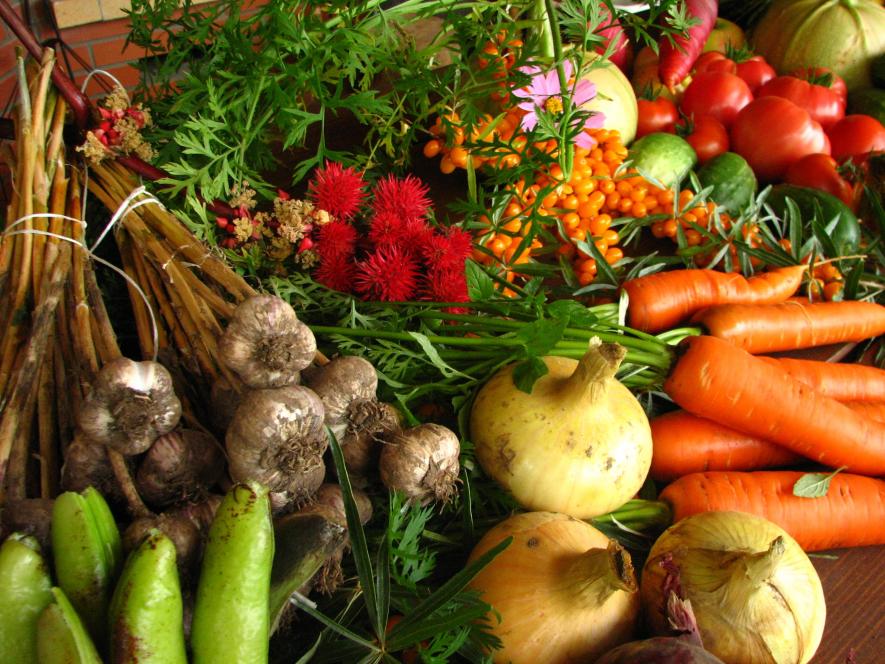Global Agrifood Sectors Turning Into Oligopolies: Report

Representational Image. Image Courtesy: Wikipedia
Oligopolies helped food barons tighten their grip on every link in the industrial food chain in 2020 as food security and health faced the onslaught of COVID-19, a recent report reveals.
Several agrifood sectors are now so “top-heavy” that only four to six dominant firms control them, the Food Barons 2022 report of the ETC Group shows while attempting to shed light on “crisis profiteering” by multinational agribusinesses since the pandemic.
“The year 2020 was a horrific year for food security and health—but a bonanza for Big Food and Big Ag(riculture). In the midst of a global pandemic, these food barons made the most of the converging crisis in order to tighten their grip on every link in the industrial food chain,” the report, published on September 20, states.
“In doing so, they undermine the rights of peasants, smallholders, fishers and pastoralists to produce food for their own communities and many others.”
The report takes an analytical look at 11 key agrifood sectors: seeds, agrochemicals, livestock genetics, synthetic fertilisers, farm machinery, animal pharmaceuticals, commodity traders, food processors, ‘Big Meat’, grocery retail and food delivery. Taking this sectoral approach, it singles out the main players and argues that oligopolies have developed in each of them.
“Economists typically consider a four-firm concentration ratio of 40% or higher reflective of a sector that operates as an oligopoly. Many of the sectors we monitor are already above that 40% threshold; others are on the verge of passing it,” the report further states.
Based on 2020 sales, the ETC Group has narrowed to four firms—Syngenta Group, Bayer, BASF and Corteva—which control half of the world’s commercial seeds and 62% of the world’s pesticide market.
Similarly, the four companies control 44% of the global market in farm machinery. The world’s largest agri-machinery company, Deere & Co, controls 18%. The story is the same in sectors like animal pharma and livestock genetics.
“Those who have market power can raise prices above what’s considered fair market value … We’re at a point in our market concentration that we haven’t seen ever before,” the report quotes Krista Brown, a policy analyst with the American Economic Liberties Project.
Other than market domination, the report elucidates “techno-fixes” being adopted by these firms to enhance profit. “Our ongoing research reveals that every sector of the industrial food chain is in the process of transforming into a digital enterprise,” the report states and provides a mind-boggling fact about the scale of this transformation.
“The vista of new digital initiatives in food and ag(riculture) is dizzying. Bayer’s ‘Field View’ digital platform, for example, extracts 87.5 billion data points from 180 million acres of farmland in 23 countries and funnels it into the cloud servers of Microsoft and Amazon. Deere, the world’s largest farm machinery company, now employs more software engineers than mechanical engineers.”
Clearly, Big Tech is becoming tightly entangled with industrial food production. The significance of all the data extracted via digital technologies is that data is now itself a commodity, the report adds.
The third striking finding in the report is how the above-mentioned oligopolies are becoming more and more opaque about their competitive (or rather anti-competitive) practices through the phenomena of “horizontal shareholding” by private equity and asset management firms.
“Horizontal shareholding is the practice of owning assets in multiple corporations that are supposed to be competing with each other but are unlikely to compete if they have common owners.” This type of shareholding, the report claims, is creating “interlocking oligopolies”.
Currently, the ‘Big Three’, State Street, Vanguard, and Blackrock, are leading asset management firms which undertake such horizontal shareholding in various publicly-traded agribusinesses. For instance, these three firms collectively own more than 20% shares in giant firms like Pepsico, Tyson, ADM, Corteva, Mosaic, and Kroger. They also own 16.76% shares in Deere and 10.16% shares in Walmart.
“In the global grocery sector, for instance, market concentration is relatively low, and competition may appear healthy, but competition is illusory because the influence of horizontal shareholders is largely invisible.”
In other words, antitrust regulators and policymakers are failing to identify interlocked oligopolies; thereby, blunting their efforts to clamp down on anti-competitive practices, the report states.
Get the latest reports & analysis with people's perspective on Protests, movements & deep analytical videos, discussions of the current affairs in your Telegram app. Subscribe to NewsClick's Telegram channel & get Real-Time updates on stories, as they get published on our website.























